Literary rating: ★★★
Kick-butt quotient: ☆☆½
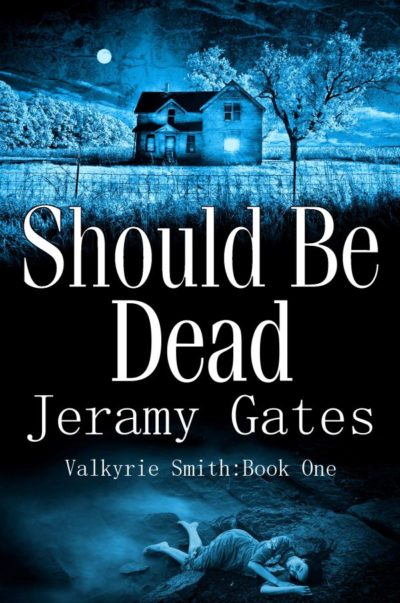 “Liberation, Val had learned, was not a simple matter of casting off stereotypes and social conventions. Nor was it a mere change in perspective. Rather, it was an evolution in state of being, a release not from consequences, but from fear.”
“Liberation, Val had learned, was not a simple matter of casting off stereotypes and social conventions. Nor was it a mere change in perspective. Rather, it was an evolution in state of being, a release not from consequences, but from fear.”
Valkyrie Smith was the sole survivor when her family had the misfortune to encounter a serial killer known as “The Collector”. Her husband and son were brutally slain, and she only escaped by hiding in a well. After a long recovery process, and still somewhat disabled, she sets out to track down the Collector and make him pay for what he did to her family. A series of mysterious clues, left for her by an anonymous party, bring Valkyrie to the Pacific coast, where it appears two killers, “Odin” and “Loki”, have teamed up and are inflicting a reign of terror on the region. Playing the risky game of posing as a federal agent, she joins the investigation under local cop Sheriff Diekmann, since it appears there’s a strong connection to the Collector. With the help of her tech advisor Matt and local reporter Riley, can she find and stop the killers before her own identity is exposed?
Despite the odd name, which is really the kind only given to heroines in thrillers like this, I liked Smith. She’s a little older than most of the genre, is intensely focused and owns one of the most kick-ass cars I’ve ever read about. It’s a restored, heavily-customized 1934 Packard, which had been her husband’s pride and joy, and now resembles something Q Branch would hand to 007, after a stern warning to pay attention. There’s little or no romance to be found here: while she beds Riley, it’s a one-night stand, born mostly out of sympathy, and causes more problems than it solves. Her independence from “official” authority gives her more flexibility; she’s better able to respond as things develop, and has no hesitation about putting herself in danger in pursuit of her targets.
The negatives I found here were mostly plot-based. Impersonating a federal agent is one thing – using your own name to do so, an unusual and highly-recognizable one at that? More seriously, the whole “anonymous” tips element bugged the hell out of me. As well as being lazy writing, it’s obvious Valkyrie is being manipulated into doing someone’s work for them. Fortunately, it’s not a major aspect here, save for the beginning and end. I have to say, I wasn’t particularly surprised by the “twist” in the latter, since it seemed obvious to me that Odin was not who Valkyrie hoped or expected. It flows instead into something pointing towards the second volume.
There was one aspect I found particularly well-done. Part of the second half is told from the perspective of one of Odin and Loki’s victims: a retired woman who, along with her husband, has becomes the target of their home-invasion. In terms of the overlying story arc, it’s mostly superfluous. Yet it’s chilling stuff, and in terms of a standalone tale, her struggle to survive may well the equal of Valkyrie’s.
“I had trusted in humanity, the basic goodness of people, that they won’t walk into your house and kill you just because they can. But that’s not the way the world is…”
Author: Jeramy Gates
Publisher: Timber Hill Press, available through Amazon as both an e-book and paperback.
Book 1 of 2 in the Valkyrie Smith Mystery Series.





 Despite the male-oriented title, there’s no doubt who the star is: Vienna (Crawford), a former saloon girl who has clawed her way up to owning her own place, on the outskirts of an Arizona mining town. She has inside knowledge of the route the railroad is going to take, and chose her location with that in mind. But there’s stiff local opposition, from those who don’t want the railroad, or who object to her allowing the Dancing Kid (Brady) and his gang, suspects in a stagecoach robbery, to frequent her establishment. Leading those with a dim view of Vienna, is Emma Small (McCambridge), whose brother was killed in the robbery.
Despite the male-oriented title, there’s no doubt who the star is: Vienna (Crawford), a former saloon girl who has clawed her way up to owning her own place, on the outskirts of an Arizona mining town. She has inside knowledge of the route the railroad is going to take, and chose her location with that in mind. But there’s stiff local opposition, from those who don’t want the railroad, or who object to her allowing the Dancing Kid (Brady) and his gang, suspects in a stagecoach robbery, to frequent her establishment. Leading those with a dim view of Vienna, is Emma Small (McCambridge), whose brother was killed in the robbery.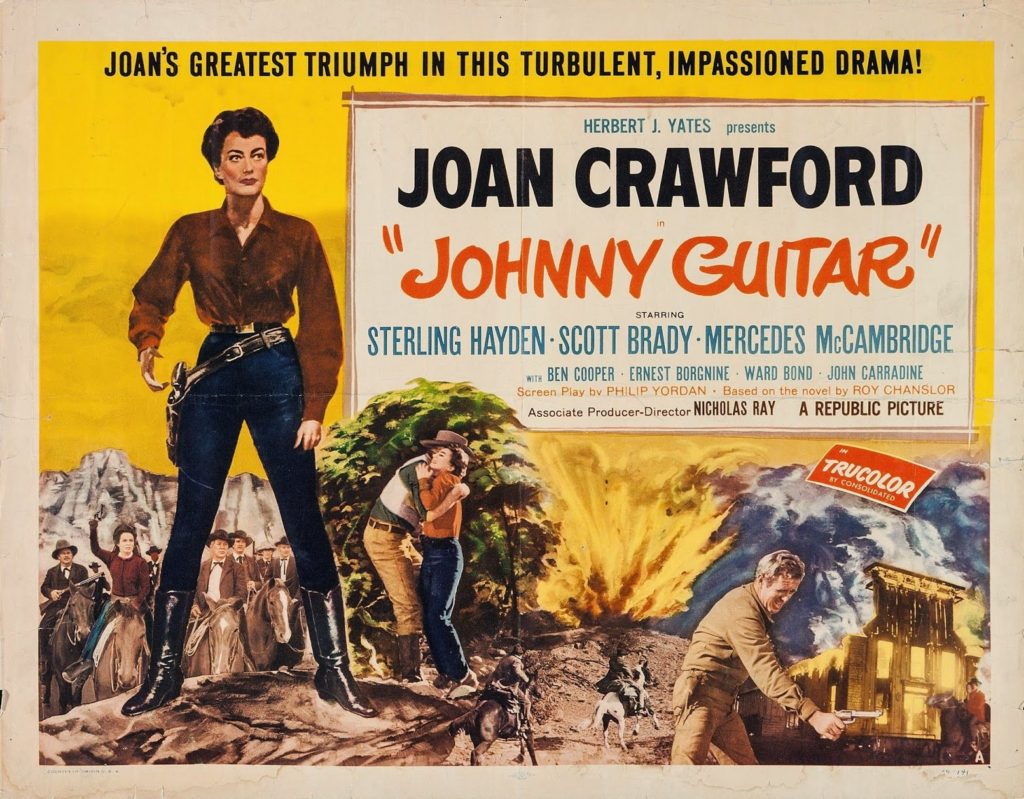
 If you think children are of one mind with regard to the gun debate, thanks to the zealots of Marjory Stoneman, the alternative view portrayed by this movie will feel amazingly transgressive and almost alien. The world it depicts is one where schools will actually teach kids how to use guns safely, handing out gun permits, and a teenage girl can receive a treasured family heirloom, in the shape of a .30-30 rifle, passed down the generations. Hunting is a way of life, and an important resource, with a particularly strong matriarchal tradition, in which three generations of women will be going into the woods together. For 12-year-old Florence (Abas), it’ll be her first excursion: in a not-too-subtle parallel, she also gets her first period.
If you think children are of one mind with regard to the gun debate, thanks to the zealots of Marjory Stoneman, the alternative view portrayed by this movie will feel amazingly transgressive and almost alien. The world it depicts is one where schools will actually teach kids how to use guns safely, handing out gun permits, and a teenage girl can receive a treasured family heirloom, in the shape of a .30-30 rifle, passed down the generations. Hunting is a way of life, and an important resource, with a particularly strong matriarchal tradition, in which three generations of women will be going into the woods together. For 12-year-old Florence (Abas), it’ll be her first excursion: in a not-too-subtle parallel, she also gets her first period.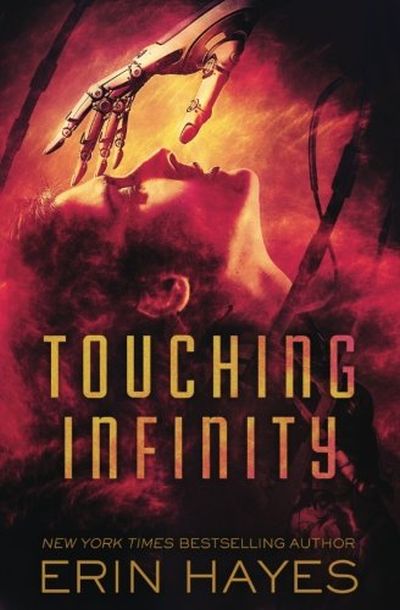 I will confess to a little post-read confusion here. Amazon calls this Volume 2 in the author’s Rogue Galaxy series – but I could find no information, there or elsewhere, regarding Volume 1. I suspect Amazon and Goodreads are wrong, and this is actually the first entry, as stated in the Dominion Rising collection. It certainly
I will confess to a little post-read confusion here. Amazon calls this Volume 2 in the author’s Rogue Galaxy series – but I could find no information, there or elsewhere, regarding Volume 1. I suspect Amazon and Goodreads are wrong, and this is actually the first entry, as stated in the Dominion Rising collection. It certainly 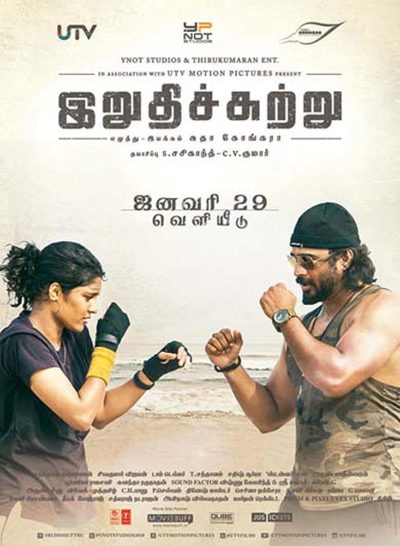 Despite thrashing virtually every sports cliché under the sun into the ground, this just about manages to skate by on the energy of its two central performances. Adi Tomar (Madhavan) is a boxing coach who gets hit with a trumped-up #MeToo charge by the head of the boxing association Dev Khatri (Hussain), and punted off to the backwoods of Chennai. There, however, he finds a raw jewel in Madhi (Singh), a fish-seller whose sister, Lakshmi (Sorcar), has been training as boxer with an eye to joining the police. But it’s Madhi’s aggression which attracts Adi’s attention, and he eventually convinces her to strap on the gloves.
Despite thrashing virtually every sports cliché under the sun into the ground, this just about manages to skate by on the energy of its two central performances. Adi Tomar (Madhavan) is a boxing coach who gets hit with a trumped-up #MeToo charge by the head of the boxing association Dev Khatri (Hussain), and punted off to the backwoods of Chennai. There, however, he finds a raw jewel in Madhi (Singh), a fish-seller whose sister, Lakshmi (Sorcar), has been training as boxer with an eye to joining the police. But it’s Madhi’s aggression which attracts Adi’s attention, and he eventually convinces her to strap on the gloves. We arrived here with Teresa Mendoza (Braga) having gunned down Don Epifanio, and made an implacable enemy of his estranged wife, Camila Vargas (Falcon). Epifanio had become the Governor of Sinaloa, a position Camila took over, using it to buttress her position at the top. She formed alliances on both sides to assist her further: notably General Cortez (Arias), who provided military muscle, and with DEA agent Alonzo Loya, to whom she fed intelligence about her rivals. However, Camila’s increasingly strained relationship with her teenage daughter ends up being used against her.
We arrived here with Teresa Mendoza (Braga) having gunned down Don Epifanio, and made an implacable enemy of his estranged wife, Camila Vargas (Falcon). Epifanio had become the Governor of Sinaloa, a position Camila took over, using it to buttress her position at the top. She formed alliances on both sides to assist her further: notably General Cortez (Arias), who provided military muscle, and with DEA agent Alonzo Loya, to whom she fed intelligence about her rivals. However, Camila’s increasingly strained relationship with her teenage daughter ends up being used against her.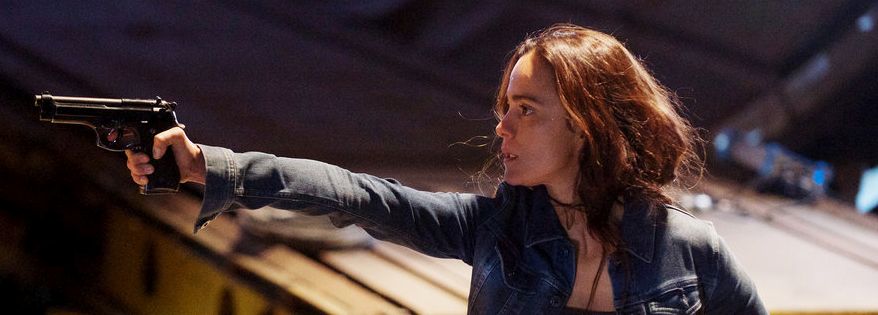
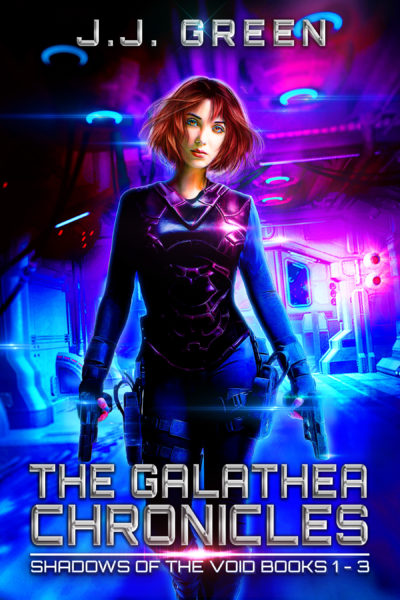 This compendium gathers together the first three (shortish) parts of Green’s Shadows of the Void series. In this, humanity has to face a malevolent alien species, the Shadows, which capture their victims, then take their shape in order to lure in more people. In these books, the threat is known but being largely kept under wraps, which is why it comes as a surprise to Jas Harrington. She’s the security officer on board a private exploration ship, sent out by the Polestar corporation to find new worlds to exploit. They find what appears to be a prime target, yet Harrington can’t shake the feeling something is wrong with the planet. Over-ruled by the ship’s captain, it turns out she was right – but by that point, the captain and almost all the officers have been replaced by their doppelgängers.
This compendium gathers together the first three (shortish) parts of Green’s Shadows of the Void series. In this, humanity has to face a malevolent alien species, the Shadows, which capture their victims, then take their shape in order to lure in more people. In these books, the threat is known but being largely kept under wraps, which is why it comes as a surprise to Jas Harrington. She’s the security officer on board a private exploration ship, sent out by the Polestar corporation to find new worlds to exploit. They find what appears to be a prime target, yet Harrington can’t shake the feeling something is wrong with the planet. Over-ruled by the ship’s captain, it turns out she was right – but by that point, the captain and almost all the officers have been replaced by their doppelgängers. That’s the voice-over with which this starts, segueing into a bit of nude interpretive dance – well, semi-nude, the guy keeps his Y-fronts on, for which I am grateful – that has absolutely no relation to the rest of the film. At its core, this is a battle of triad versus triad: one overseen by Lau, the other by Fung. The former is assassinated, and his daughter, Angel (Yeung) takes over – she’s also keen to track down the perpetrators, with the most obvious beneficiary being Fung. But not so sure is Fung’s right-hand man, Jimmy Lee (Lee), who was there for the killing, and helps Angel’s investigation.
That’s the voice-over with which this starts, segueing into a bit of nude interpretive dance – well, semi-nude, the guy keeps his Y-fronts on, for which I am grateful – that has absolutely no relation to the rest of the film. At its core, this is a battle of triad versus triad: one overseen by Lau, the other by Fung. The former is assassinated, and his daughter, Angel (Yeung) takes over – she’s also keen to track down the perpetrators, with the most obvious beneficiary being Fung. But not so sure is Fung’s right-hand man, Jimmy Lee (Lee), who was there for the killing, and helps Angel’s investigation. This is a modern update of the story of Savitri and Satyavan, originally found in Indian epic saga the Mahabharata [and when I say, “epic saga”, it’s 1.8 million words long!]. The tale has been an immensely popular topic for Bollywood, Wikipedia saying there have been thirty-four different film versions, dating back over a century to 1914’s Satyavan Savitri. The basic story is of a woman, Savitri, who defies a prediction that her chosen husband, Satyavan, will die in a year, and marries him anyway. She then has to talk the god of death out of collecting him.
This is a modern update of the story of Savitri and Satyavan, originally found in Indian epic saga the Mahabharata [and when I say, “epic saga”, it’s 1.8 million words long!]. The tale has been an immensely popular topic for Bollywood, Wikipedia saying there have been thirty-four different film versions, dating back over a century to 1914’s Satyavan Savitri. The basic story is of a woman, Savitri, who defies a prediction that her chosen husband, Satyavan, will die in a year, and marries him anyway. She then has to talk the god of death out of collecting him.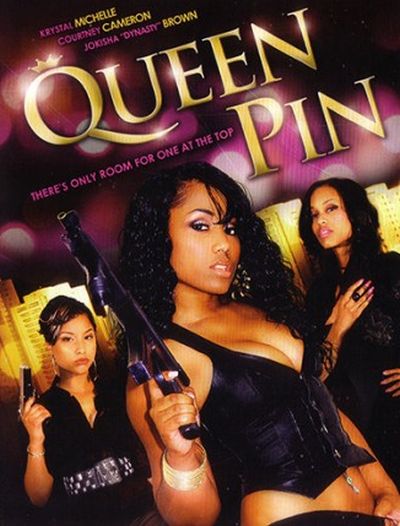 Rhanni (Brown) falls for the notorious Florida drug-dealer Seven (Bird) hard – to the extent she’s prepared to overlook the fact he’s married. Instead, she becomes his best friend, and works alongside him in the pharmaceutical business. When he is gunned down by his rivals, Rhanni decides to take what she has learned and put it into practice. She assembles her team of loyal but brutal associates, and sets out to take over the town. This brings her unwanted attention from two groups. Firstly, the authorities, who are always seeking to snare one of her underlings, and get him to snitch on his boss. More lethally, there’s the mysterious “Genie”, the current top dog, whose face no-one has seen. Genie sends Lil’ Miller (Michele) to take out Rhanni, only for the hitwoman to throw her lot in with the intended target.
Rhanni (Brown) falls for the notorious Florida drug-dealer Seven (Bird) hard – to the extent she’s prepared to overlook the fact he’s married. Instead, she becomes his best friend, and works alongside him in the pharmaceutical business. When he is gunned down by his rivals, Rhanni decides to take what she has learned and put it into practice. She assembles her team of loyal but brutal associates, and sets out to take over the town. This brings her unwanted attention from two groups. Firstly, the authorities, who are always seeking to snare one of her underlings, and get him to snitch on his boss. More lethally, there’s the mysterious “Genie”, the current top dog, whose face no-one has seen. Genie sends Lil’ Miller (Michele) to take out Rhanni, only for the hitwoman to throw her lot in with the intended target.